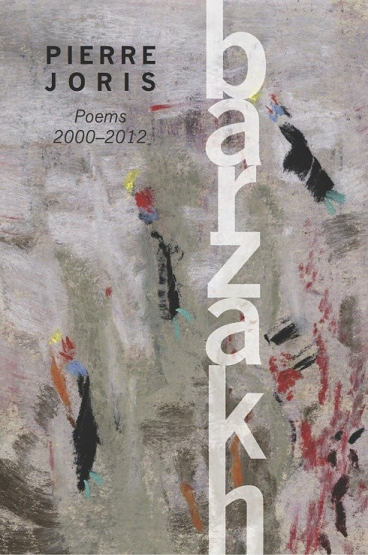Pierre Joris: From 'Barzakh' (Poems 2000–2012)

[It is astonishing to me how Pierre Joris, whom I’ve known going back into his jeunesse (& almost into mine) has emerged as an exemplar of a total poetics, at the heart of which is that nomadic poetics which he’s been delivering to us over the last three or four decades with such singular force. As with many of us who have tried to define ourselves as poets & sentient beings, it is the poetry itself that precedes and determines what we later say about it. The wonder, then, in Joris’s twenty-first-century book, Barzakh: Poems 2000-2012 (Black Widow Press), is how that poetry has continued to stake out new territory & to demonstrate over & again his ability to seed his work with a wide & meaningful range of times & places, yet with an awareness, never faltering, of the immediate world around him. In announcing Barzakh on Poems and Poetics, I’ve chosen to excerpt from a longer poem in which a form of traditional alphabetic mysticism (a key source of poetry outside of the normative poetry nexus) is the principal subtext for the work as a whole. Here in its Arabic/Islamic form it resembles what I’ve pursued as Hebraic gematria in other contexts. (J.R.)]
from AN ALIF BAA
Preamble to an Alphabet
letters arose
says Abu al-Abbas Ahmed al-Bhuni
letters arose
from the light of the pen
inscribed the Grand Destiny
on the Sacred Table
after wandering through the universe
the light transformed
into the letter alif,
source of all the others.
another arrangement of letters
into words and words
into stories has it
that Allah created the angels
according to the name & number
of the letters so that they should
glorify him with an infinite
recitation of themselves as arranged
in the words of the Qu’ran.
and the letters prostrated themselves
and the first to do so was the alif
for which Allah appointed the alif to be
the first letter of His name & of the
alphabet.
آ
[ALIF]
Adam is said to have written a number of books three centuries before his death. After the Flood each people discovered the Book that was destined for it. The legend describes a dialogue between the Prophet Muhammad and one of his followers, who asked: ‘By what sign is a prophet distinguished?’
‘By a revealed book,’ replied the Prophet.
‘O Prophet, what book was revealed to Adam?’
‘A, b… ‘ And the Prophet recited the alphabet.
‘How many letters?’
‘Twenty-nine letters/’
‘But, oh Prophet, you have counted only twenty-eight.’
Muhammad grew angry and his eyes became red.
‘O Prophet does this number include the letter alif and the letter lam?’
‘Lam-alif is a single letter…. he who shall not believe in the number of twenty-nine letters shall be cast into hell for all eternity.’
1.
and Alif has many seats
under which he is silent
though you cannot call it suffering
suffering rhymes with zero
at least initially
a sweet round perfection
as we like to draw it
doodling one into the other
(newspaper margins of the b&w middle fifties
at Mme Cavaiotti’s where I wrote
or learned to daily at 5 p.m. whose husband
told me that in the last war (which wasn’t
the last at all) he had been
forced to drink his piss from his boot
in the desert of Libya, his wife linking
zeroes, rounds, in the margins of the daily
“Wort,” making, making writing
a chain of nothingness
that is something
and that is our fate und Fluch:
that we have to do something
even to achieve the nothing
even if only we doodle
ourselves through life
while talking on the phone
to someone doodling elsewhere
while all we mumble are
sweet nothings chains
of linked zeroes
yet
step back & focus shifts
a shape emerges from the space created
by the two circles’
intersections,
mandorla,
wherein stands
the shape of Celan’s eye, of the fruit
of the almond tree,
there stood, maybe,
the names of the six kings
of Madyan, make up the letters
of the Arabic
alphabet.
The nothing, where does it stand?
It stands outside the almond,
it stands in the shells
of the suffer’un
the zero-crescents
above & below
(“Human curl, you’ll not turn gray,
Empty almond, royal-blue”)
fall away
as the almond looms,
yet remain as links
of a chain,
isthmus-claws
sew mandorla to
mandorla
2.
What a place that must be,
a something at least, to be in
and if that nothingness
was the hamza
a sort of zag without a zig
a future breath half taken now
with always something more
solid, important coming right
behind it.
a kind of fishing hook.
which puts an odd occasion
on this table:
a fishing hook
equals
a future breath
here lie the roots of another
surrealism yet to come
when we find the zig goes with
the orphaned zag.
Poems and poetics